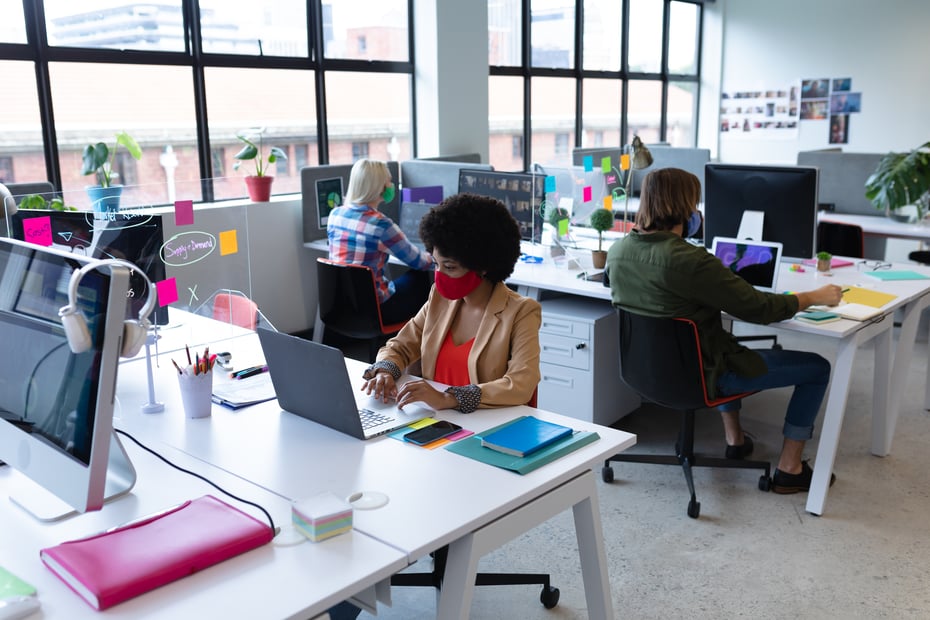How to Keep Your Workplace Free of Stigma for COVID Survivors

Millions of people in the U.S. were infected with COVID-19. While many of those infected recovered, they may encounter a significant amount of stigma from their peers. Here’s how businesses can protect their corporate culture.
For those who have recovered from the COVID-19 disease, some have found they’re being stigmatized by their peers. From avoidance and passive-aggressive comments to outright exclusion, stigmatization is a very real problem that’s having a disastrous effect on well-being and performance.
But why is there stigma? In most cases, it boils down to ignorance, fear, and insufficient open conversation about the struggles of COVID survivors.
To combat this, businesses need to develop plans to protect their corporate culture and employees. Let’s take a closer look at workplace stigma and the impact of COVID. We’ll also offer tips on how businesses can keep their workplaces safe and supportive environments for survivors.
What is Stigma in the Workplace?
Stigma is the negative view or attitude towards someone due to a particular characteristic or difference. Common examples include stigmatizing people regarding their race, gender, religion, or physical and mental ability. If left unchecked, stigma can lead to discrimination and harassment in the workplace.
Discrimination is commonly associated with the above factors—but it can also rear its head in communities struggling with contagious diseases—such as COVID-19 (Image Source).
The Stigma Attached to COVID-19
Stigma is bad for physical and mental health. It can lead to chronic stress, which is linked to anxiety, depression, heart disease, and a range of other illnesses.
"One of the things that COVID stigma can look like is gossip, social rejection, and denying services generally," adds Valerie Earnshaw, associate professor in human development and family sciences at the University of Delaware in Newark. Think of the last time you coughed at the grocery store. Even with a mask on, you probably got side-eye and dirty looks.”
"Stigma associated with diseases is as old as disease in humans," she adds.“Whenever there is a sense that someone is a bad person or did something wrong in the mix, you're pretty firmly in stigma territory." Image Source
Globally, stigma has led to violence and discrimination against healthcare workers, as well as a surge in hate crimes against Asians, who appear to be experiencing more discrimination—and many of them say it’s happening at work.
In Australia, 66.4% of Asian Australian respondents to a survey conducted in October 2020 reported experiencing workplace discrimination. This represented an increase of almost 15% than previous months. The pandemic worsened dramatically during that time, with coronavirus cases surging globally.
Meanwhile, the UK experienced a drop in the employment rate among Chinese people (4.6%) from the first quarter of 2020 to the second. This showed three times the decline experienced by other ethnic groups, according to government data.
"It is likely that the high representation of Chinese and East Asian people in hard-hit sectors like hospitality is part of it, but direct discrimination by employers may play a role too,” Frances O’Grady, general secretary of the Trades Union Congress, a British coalition of labor unions, told CNN Business.
How Businesses can Create a Safe Space for COVID Survivors
Education is key. The Centers for Disease Control and Prevention and the World Health Organization offer plenty of helpful advice. For example, business leaders can help prevent stigma by sharing accurate information about how the virus spreads, making sure images used in communications show diverse teams and departments without reinforcing stereotypes. Managers can also speak out against stereotyping groups who experience stigma because of COVID-19.
Sharing stories from those who have recovered from COVID-19 can be incredibly helpful at fostering empathy and understanding, and minimizing a discriminatory mentality.
As Marjorie Roberts, a life coach who was launching her career before falling ill with COVID in March 2020, explains: "COVID-19 doesn't care that I had a Ph.D. COVID-19 doesn't care what kind of car you drive or how many bedrooms or bathrooms you have in your house, or where you shop, or what your status is."
It’s also important to let employees know they’re supported. Consider investing in workplace wellness programs so employees can better manage their health and well-being. With CoreHealth, employees can take advantage of counseling, coaching, and telehealth services. These programs support and educate employees to stay physically and mentally healthy, motivated, and productive. Preventative care is one of CoreHealth's core values. As a result, we developed our 'Infection Protection' Workplace Wellness Challenge to teach employees how to protect themselves from the cold, flu, and viruses such as COVID-19. Additionally, presenting it as a topic in a challenge puts it out there for people to talk about to help reduce stigmatism.
Final Thoughts
The post-pandemic return to work is creating many challenges for employees with reservations about safety, those struggling with mental health issues, and individuals who might need assistance navigating the “new normal.” 
Companies can help survivors by providing personalized assistance and increased support to the most vulnerable groups, while protecting the interests of those with different personal and professional needs. Meanwhile, open communication and education throughout the business about discrimination and safety will help empathize with employees who are COVID survivors, rather than stigmatizing them.
If you would like to prepare to welcome employees back to the office while helping to protect them from social and mental challenges, contact us today. We will be happy to connect you with the right resources.
About CoreHealth Technologies
CoreHealth Technologies Inc. is a total well-being technology company trusted by global providers to power their health and wellness programs. Our wellness portals help maximize health, engagement, and productivity for 3+ million employees worldwide. We believe people are the driving force of organizations and supporting them to make behavior changes to improve employee health is in everyone’s best interest. With the most flexibility, customizations, and integrations of any software in its class, CoreHealth’s all-in-one wellness platform helps grow great wellness companies. Simple to sophisticated, based on you. For more information, visit the CoreHealth website.
About The Author
Your Friends in Health at CoreHealth
CoreHealth by Carebook's Health and Wellness Team works hard to bring our readers informative and research validate health and well-being blog articles and resources that support your workplace wellness culture and wellness technology purchase decision.


